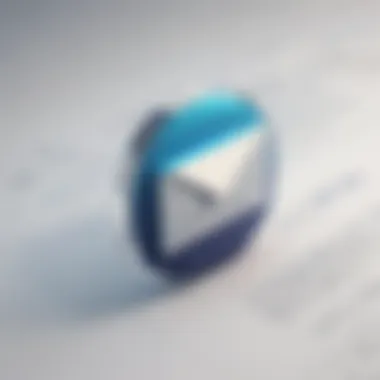Crafting the Perfect Job Email: A Step-by-Step Guide for Effective Communication


Crafting the Perfect Job Email is a crucial skill in the professional world. From catching the recruiter's eye to effectively showcasing your qualifications and interest in a job opportunity, mastering the art of writing a compelling job email can truly set you apart in the competitive job market. In this comprehensive guide, we will delve deep into the intricacies of composing a flawless job email to maximize your chances of landing that dream job.
Introduction
In today's fast-paced job market, where digital communication reigns supreme, sending a well-crafted job email can make a significant impact on potential employers. An effective job email should not only convey your professional skills and experience but also reflect your communication abilities and attention to detail. As such, understanding the nuances of structuring and composing a job email is paramount for any job seeker aiming to make a positive impression.
Key Components of a Job Email
Subject Line
The subject line serves as the first point of contact with the recipient and should succinctly capture the essence of your email. A compelling subject line can pique the recipient's interest and increase the likelihood of your email being opened and read. Crafting a subject line that is both attention-grabbing and relevant to the job opportunity is crucial in ensuring that your email stands out amidst the sea of applications.
Salutation
The salutation sets the tone for your email and establishes a professional rapport with the recipient. Addressing the recipient by their name and using appropriate salutations, such as 'Dear [Recipient's Name],' adds a personal touch to your email and reflects your attention to detail and courtesy.
Introduction
The introduction should succinctly introduce yourself and express your interest in the job opportunity. Clearly stating the position you are applying for and highlighting a few key achievements or qualifications can instantly capture the recipient's attention and convey your suitability for the role.
Body Content
The body of the email is where you delve into further detail about your qualifications, experience, and why you are the ideal candidate for the job. It is essential to tailor the content of your email to align with the requirements of the job posting and showcase how your skills and expertise make you a perfect fit for the role.
Closing
The closing of the email should reiterate your interest in the position, express gratitude for the recipient's time and consideration, and provide a polite sign-off, such as 'Best Regards' or 'Sincerely.' Ending your email on a positive and professional note leaves a lasting impression on the recipient.
Conclusion
Crafting a perfect job email requires careful attention to detail, a clear understanding of the job requirements, and an ability to effectively communicate your qualifications and interest. By following the key components outlined in this guide and tailoring your email to each job opportunity, you can enhance your chances of securing interviews and ultimately landing your desired job role. Mastering the art of writing a perfect job email is a valuable skill that can propel your career to new heights in the competitive job market.
Understanding the Importance of a Job Email
Crafting the perfect job email is more than just typing words on the screen. It is a strategic communication tool that can make or break your job application. In this competitive job market, standing out is crucial, and your email is the first impression a potential employer will get of you. By understanding the importance of a job email, you can effectively showcase your qualifications and interest in a professional manner.
Setting the Right Tone
When it comes to setting the right tone in your job email, the choice between a formal or informal tone can significantly impact how your message is received. A formal tone exudes professionalism and respect, ideal for initial contact with potential employers. On the other hand, an informal tone can convey a sense of friendliness and approachability. Tailoring the tone to suit the company culture is essential as it shows your ability to adapt and fit within the organization.


Formal vs. Informal Tone
The formal tone is characterized by its adherence to standard grammar and respectful language. It is a preferred choice for job emails as it maintains a professional image and sets a serious tone from the outset. In contrast, an informal tone, while friendlier, can sometimes come across as unprofessional in a job application context. Understanding when to use each tone is crucial in crafting the perfect job email.
Tailoring Tone to Company Culture
Adapting your tone to align with the company's culture demonstrates your awareness and respect for their values. By mirroring the communication style prevalent within the organization, you can signal your suitability for the role. However, a potential downfall of this approach could be losing your authentic voice in an attempt to conform.
Professionalism in Communication
Maintaining professionalism in your job email is non-negotiable. Avoiding jargon and slang ensures clarity in communication and presents you as a competent candidate. Furthermore, using polite and respectful language reflects positively on your interpersonal skills, essential in a professional context.
Avoiding Jargon and Slang
Jargon and slang have the potential to confuse the recipient and detract from the clarity of your message. By opting for clear and concise language, you demonstrate your ability to effectively communicate complex ideas without relying on industry-specific terms.
Politeness and Respectful Language
The tone of your email sets the stage for the conversation. Incorporating polite and respectful language fosters a positive interaction and showcases your professional demeanor. It's imperative to strike a balance between formality and warmth to convey your message effectively.
Personalization vs. Generic Templates
In a sea of job applications, personalization can set you apart from the crowd. Customizing your content for each application demonstrates your genuine interest in the position and enhances your chances of making a memorable impression. Avoiding generic phrases and templates adds a touch of originality to your email and shows that you have put thought and effort into your application.
Customizing Content for Each Application
Tailoring your content to address specific requirements mentioned in the job listing showcases your attentiveness and understanding of the role. This personalized approach can resonate with recruiters and highlight your suitability for the position.
Avoiding Generic Phrases
Generic phrases can make your email blend in with the multitude of applications recruiters receive daily. By avoiding cliches and generic language, you can make your email more engaging and demonstrate your authenticity. Crafting unique and tailored messages can leave a lasting impact on the recipient.
Structuring Your Job Email Effectively
Writing a job email with precision is crucial. When you Structure Your Job Email Effectively, you ensure that every element works in harmony to convey your message clearly and professionally. The way you organize the information, from the subject line to the closing remarks, impacts how well your email is received. By structuring it properly, you can grab the recipient's attention and make a lasting impression.
Subject Line Optimization
Clarity and Relevance


Clarity and Relevance are paramount in crafting an effective subject line. It's essential to be clear about the content of your email and ensure that the subject line accurately reflects the purpose of your message. Relevance is equally crucial, making sure that the subject line aligns with the recipient's expectations. A clear and relevant subject line not only increases the chances of your email being opened but also sets the tone for the entire communication process. It helps in conveying professionalism and respect for the recipient's time.
Avoiding Ambiguity
Avoiding ambiguity in your subject line is key to preventing any misunderstandings or confusion. Ambiguity can lead to your email being overlooked or misinterpreted, which can hinder effective communication. By steering clear of vague or cryptic subject lines, you establish trust and credibility with the recipient. Being direct and straightforward in your subject line shows that you value clarity and transparency in your interactions. It ensures that your message is received and understood as intended, facilitating a smooth communication flow.
Introduction and Greeting
Personalized Greetings
Personalized greetings add a touch of warmth and personalization to your email. Addressing the recipient by their name or using a specific detail shows that you've taken the time to tailor your message to them. Personalization creates a connection right from the start, making the recipient feel valued and respected. It sets a positive tone for the rest of the email and helps in building rapport with the reader.
Brief Introduction
A brief introduction sets the context for your email and provides a snapshot of what the recipient can expect. It concisely outlines the purpose of your message and generates interest. A well-crafted introduction captures the recipient's attention and encourages them to continue reading. By keeping it succinct yet impactful, you engage the reader from the outset and lay the foundation for a compelling email.
Body of the Email
Highlighting Relevant Experience
Highlighting relevant experience showcases your qualifications and suitability for the job. It's essential to focus on experiences that align with the job requirements and highlight your strengths. By emphasizing relevant achievements, you demonstrate your capabilities effectively. This section serves as a powerful tool to capture the employer's interest and make a strong case for why you are the ideal candidate.
Showcasing Skills and Achievements
Showcasing your skills and achievements adds depth to your application. Presenting concrete examples of your accomplishments provides evidence of your capabilities. By showcasing your skills effectively, you differentiate yourself from other candidates and illustrate your potential value to the employer. It's crucial to tailor this section to align with the job role and emphasize how your skills can contribute to the company's success.
Call to Action and Closing
Clear Next Steps
Including a clear call to action outlines the desired response from the recipient. Whether it's scheduling an interview or requesting further information, a call to action directs the next course of action. By providing clear instructions, you make it easy for the recipient to respond appropriately. A well-defined call to action streamlines the communication process and facilitates a prompt and relevant reply.
Polite Conclusion
A polite conclusion wraps up your email on a gracious note. Expressing gratitude for the recipient's time and consideration adds a courteous touch to your message. A polite conclusion shows professionalism and leaves a positive impression. It's essential to end your email with courtesy and respect, ensuring that the recipient feels appreciated and valued. This final gesture reflects your communication etiquette and leaves a lasting mark on the reader.
Enhancing Content Quality and Relevance
In the competitive landscape of job applications, ensuring the quality and relevance of your content is paramount. Your email serves as the first impression of your communication skills and professionalism. It is crucial to pay meticulous attention to detail to avoid errors, maintain clarity, and capture the interest of the recipient. Elevating the content quality sets you apart as a candidate who values precision and excellence. Moreover, relevance is key in demonstrating your understanding of the job role and how your qualifications align with the company's needs and values. By enhancing both quality and relevance, you portray yourself as a thoughtful and competent candidate that recruiters are eager to engage with.


Proofreading and Editing
- Checking for Errors: The process of scrutinizing your email for errors ensures that your communication is polished and error-free. It involves meticulously examining the email for typos, grammatical mistakes, and formatting inconsistencies. By conducting thorough error checks, you communicate competence and attention to detail, crucial qualities in a professional setting. Detecting and rectifying errors before hitting 'send' enhances the overall quality of your email and conveys a sense of credibility to the recipient.
- Ensuring Clarity: Clarity in communication is non-negotiable when crafting a job email. Ensuring that your message is concise, coherent, and easily understood is essential to convey professionalism. By prioritizing clarity, you facilitate smooth comprehension for the reader, enhancing the effectiveness of your communication. Clear, well-structured content reflects positively on your communication skills and showcases your ability to convey information in a direct and impactful manner.
Incorporating Keywords and Key Information
- Highlighting Key Qualifications: Strategic placement of key qualifications in your email reinforces your suitability for the job role. Highlighting relevant skills and experiences immediately captures the attention of recruiters, emphasizing your alignment with the job requirements. By showcasing key qualifications, you make it easier for hiring managers to identify your potential as a candidate, setting you apart from the competition.
- Aligning with Job Description: Aligning your content with the job description demonstrates a tailored approach to your application. By carefully integrating keywords and key information from the job posting, you signal to recruiters that you have taken the time to understand their requirements. This alignment increases the relevance of your email, showcasing your proactive attitude and attention to detail.
Showcasing Enthusiasm and Interest
- Expressing Genuine Interest: Genuine interest displayed in your email reflects your motivation and engagement with the job opportunity. Expressing enthusiasm for the role and company culture adds a personal touch to your application. Emphasizing your genuine interest distinguishes you as a candidate who is not only qualified but also genuinely invested in contributing to the organization's success.
- Conveying Passion for the Role: Conveying passion for the role goes beyond listing qualifications; it encapsulates your excitement and commitment to the potential position. By demonstrating passion, you showcase your dedication and determination to excel in the role. Communicating your enthusiasm persuasively can leave a lasting impression on recruiters, illustrating your potential to be a valuable asset to the company.
Finalizing and Sending Your Job Email
In the process of crafting the perfect job email, finalizing and sending it holds paramount importance. It serves as the ultimate stage where all your efforts culminate into a polished piece of communication, ready to make an impact on the recipient. Finalizing your job email involves thorough scrutiny and attention to ensuring its accuracy and relevance. Sending it signifies the moment of truth, where your message is set to reach its destination and hopefully leave a positive impression.
Reviewing Before Sending
Final Checks for Accuracy
Final checks for accuracy are a critical aspect of the finalization process before sending out your job email. This stage involves meticulously examining every detail of your email, from grammar and spelling to factual accuracy. Ensuring that your email is error-free demonstrates your professionalism and attention to detail. Accuracy in your job email is crucial as even minor mistakes can create a negative perception of your competence and commitment to the role.
Ensuring Proper Attachments
The inclusion of proper attachments in your job email is a significant factor in enhancing the overall quality of your application. Whether it's a resume, portfolio, or any other relevant document, attaching the right files can provide additional depth to your profile and showcase your qualifications effectively. Proper attachments play a key role in supporting the information presented in your email and offering further insights into your skills and experiences, thereby strengthening your candidacy.
Choosing the Right Time to Send
Optimal Days and Times
Selecting the optimal days and times to send your job email can significantly impact its visibility and reception. By sending your email on days when the recipient is likely to have a lighter workload or be more receptive, you increase the chances of it being noticed and attended to promptly. Timing your email strategically can help you stand out amidst a sea of applications and demonstrate your proactive approach to communication.
Avoiding Peak Hours
Avoiding peak hours in email communication is a wise strategy to ensure that your message doesn't get lost in a crowded inbox. Sending your job email during peak hours when recipients are inundated with numerous messages can diminish its chances of being seen or considered. By sidestepping peak times, you can improve the likelihood of your email garnering the attention it deserves and increase the possibility of receiving a prompt response.
Follow-Up Strategies
Crafting Follow-Up Emails
Crafting follow-up emails is an effective strategy to reiterate your interest in the role and keep yourself on the recruiter's radar. A well-crafted follow-up email should be courteous, concise, and personalized to demonstrate your continued enthusiasm for the opportunity. Following up shows your proactive nature and willingness to go the extra mile in pursuing the position, potentially setting you apart from other candidates.
Timely Responses
Timely responses to emails, especially those related to job applications, are crucial in showcasing your professionalism and promptness. Responding promptly to any communication from the employer reflects your respect for their time and deadlines. A quick and efficient response demonstrates your reliability and commitment to open and timely dialogue, qualities that are highly valued in prospective employees.



